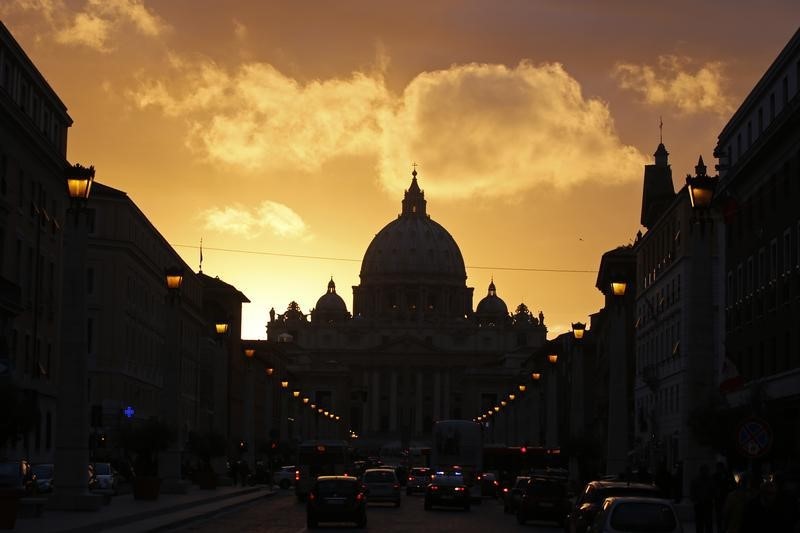* Cardinal Pell denies police charges of historical sexual abuse
* Pell is highest-ranking Church official charged with abuse
* Vatican treasurer says he will obey summons to appear on July 18
* Case piles pressure on Pope Francis to tackle sexual abuse (Updates with Pell's comments)
By Byron Kaye and Philip Pullella
SYDNEY/VATICAN CITY, June 29 (Reuters) - Cardinal George Pell, a top adviser to Pope Francis, said on Thursday he was innocent of charges of sexual abuse in his native Australia, and that the pontiff had given him leave of absence to return there to defend himself.
"I am looking forward finally to having my day in court. I repeat that I am innocent of these charges. They are false," Pell, 76, told a hastily called news conference, hours after Australian police charged him with multiple historical sex crimes.
The Vatican spokesman, Greg Burke, said that, while the Holy See had respect for the Australian justice system, it noted that Pell had cooperated with investigations in the past.
Pell, the Vatican's financial controller since 2014, is the highest-ranking Church official to be charged with sexual abuse.
Police in the Australian state of Victoria, where Pell was a country priest in the 1970s, said he faced "multiple charges in respect of historic sexual offences" from multiple complainants.
They did not detail the charges against Pell or specify the ages of the alleged victims or the period when the crimes were alleged to have occurred. He was ordered to appear before Melbourne Magistrates' Court on July 18.
Pell told an Australian government inquiry into institutional child abuse last year that the Church had made "catastrophic" choices by refusing to believe abused children, shuffling abusive priests from parish to parish, and relying too heavily on the counsel of priests to solve the problem.
VICTIMS ANGERED
But he angered victims by saying he was too ill to fly home, testifying instead from Rome.
Last July, Victoria police confirmed that Pell himself was being investigated on suspicion of child sexual abuse.
Francis said at the time that Pell should not undergo trial by media, adding: "It's in the hands of the justice system and one cannot judge before the justice system ... After the justice system speaks, I will speak."
But the latest development puts pressure on the pope to make good on promises finally to root out sexual abuse in the Church and act against those who cover it up.
Marie Collins, the top non-clerical member of a papal commission on abuse, resigned in frustration this year, citing "shameful" resistance to change within the Vatican.
Church sexual abuse broke into the open in 2002, when it was discovered that U.S. bishops in the Boston area had simply moved abusers to new posts instead of defrocking them.
Thousands of cases have come to light around the world as investigations have encouraged long-silent victims to go public, shattering the Church's standing in places such as Ireland, and tens of millions of dollars have been paid in compensation.
"I would suspect (the charges against Pell) are going to be stunning to the Vatican and to the pope himself," said Thomas P. Doyle, the U.S. priest whose report on sexual abuse in the Church led to the discovery of cover-up practices in Boston.
VATICAN REFUGE
Under previous popes, the Vatican, a sovereign state in the middle of Rome, sheltered officials wanted by other countries.
In the early 1980s, the Vatican refused an Italian request to hand over Archbishop Paul Marcinkus - an American who was then head of the Vatican bank and was wanted for questioning about the fraudulent bankruptcy of a private Italian bank.
Cardinal Bernard Law of Boston moved to Rome after a sexual abuse scandal erupted in his diocese, and has been living in the Italian capital for more than 15 years.
Victims groups were outraged when Law, now 85 and retired, was given a plum job as chief priest at a Rome basilica by the late Pope John Paul II.
However, Francis was tough in the case of Jozef Wesolowski, a former archbishop who was accused of paying for sex with minors while serving as papal ambassador in the Dominican Republic.
Wesolowski was recalled in 2013, defrocked and arrested in the Vatican in 2014, but died shortly before his trial was due to start in 2015.
Victims' support groups say successive popes have failed to grasp the gravity of the situation, but welcome the judicial steps.
"It would be naive for us to assume that people will be only relieved," said Neil Woodger, vice president of the In Good Faith Foundation, which says it represents 460 victims of Catholic Church abuse in Australia.
"They're going to be experiencing a bit of distress as well," he said. "It is a result that, I think, points to justice working and that justice is there for everybody."
